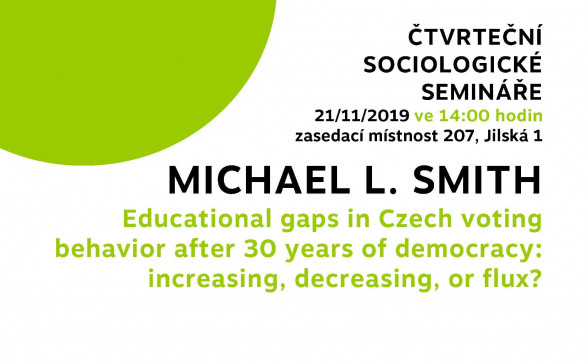Sociologický ústav AV ČR, v.v.i., a katedra sociologie Institutu sociologických studií FSV UK si Vás dovolují pozvat na podzimní cyklus Čtvrtečních sociologických seminářů.
As John Dewey expressed it, “democracy has to be born anew every generation, and education is its midwife.” Education is not only essential to a democratic society, but is also a key predictor (though rarely the strongest) of how people vote. It is also a primary lens through which both sociologists and pundits understand the electoral choices citizens make.
In this seminar, we will investigate whether the impact of educational attainment on electoral choices has increased, decreased, or has randomly fluxuated over the course of Czech democracy: from the 1992 to the 2017 parliamentary elections. The so-called “education gap” in voter behavior – i.e. normally understood as the set of differentials between the political parties that well-educated citizens versus poorly educated citizens vote for – has gained increased scholarly attention in recent years due to the success of populist parties in Europe, which purportedly have a base of support among less educated citizens. If this is the case, the breakdown of electoral support among ‘traditional’ Czech political parties in favor of new ‘populist’ parties should lead to an increase in the association between educational attainment and electoral choice. But is this the case?
To answer this fundamental question of Czech democratic politics, we will present the results of multinomial logistic regressions of “total education voting,” that is, the summary statistic of the overall association of categories of educational attainment on nominal party choices across Czech parliamentary elections and taking into account basic controls. In addition to total education voting, we also highlight temporal changes in the effect of education on discrete political parties of interest (ODS, ANO, CSSD, etc). One of the benefits of the MLR approach is that we can jettison with a common practice among sociologists of politics: analyzing voter participation separately from voter choice in elections, instead conceiving non-voters as a separate category of voter choice in multinomial regression. This is especially important because educational attainment has a particularly strong role in voter participation rates, and the effect of education on turnout should be analyzed simultaneously with other voter choices. The results? Come to the seminar to find out!
Michael L. Smith, Ph.D. is a senior researcher at the Institute of Sociology and the Economics Institute, Czech Academy of Sciences. He also co-directs the CHID Prague program of the University of Washington, Seattle. He received B.A. degrees from the University of Washington in Seattle, M.A. from Boston College, and his PhD in Political Science from the New School for Social Research in New York. He was one of three principal investigators leading the development of the annual Czech Household Panel Study, and has helped implement Czech ISSP and PIAAC follow-up surveys. He also led the team creating www.politickefinance.cz, the database of Czech political party financing. He publishes primarily in international sociological journals in the areas of social stratification and inequality, as well as the role of stratification processes on a variety of social and political outcomes.
Seminar will be held in English. No registration is needed.



Facebook
Twitter
Tweets by SociologickyNewsletter